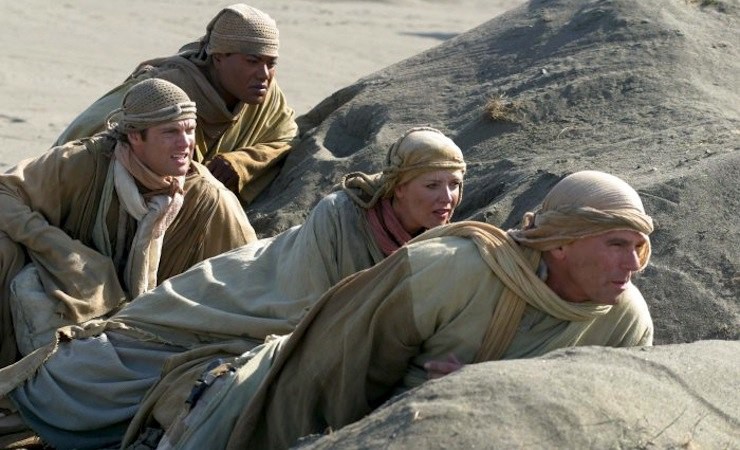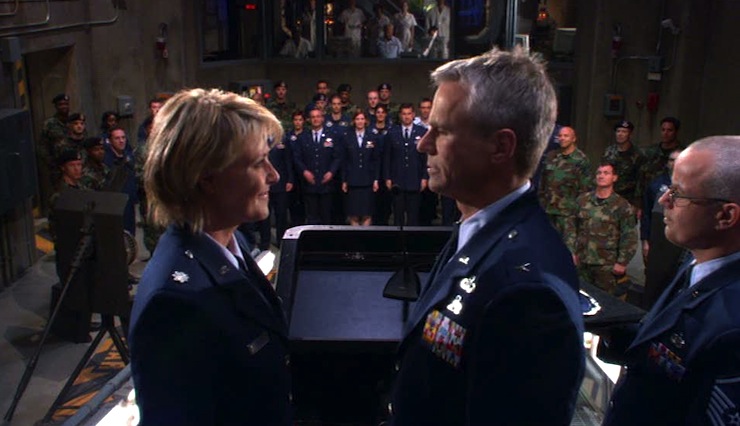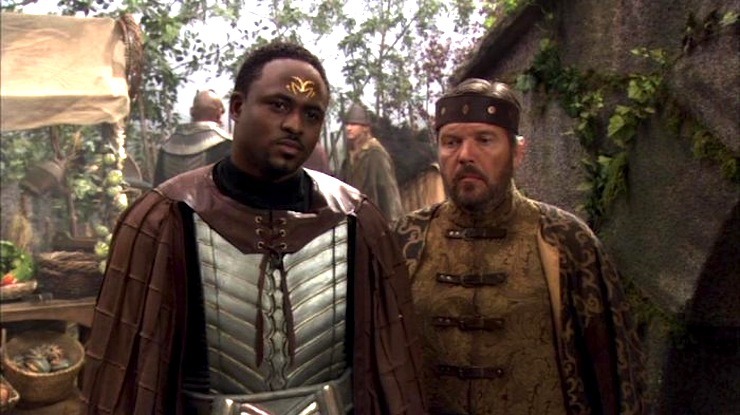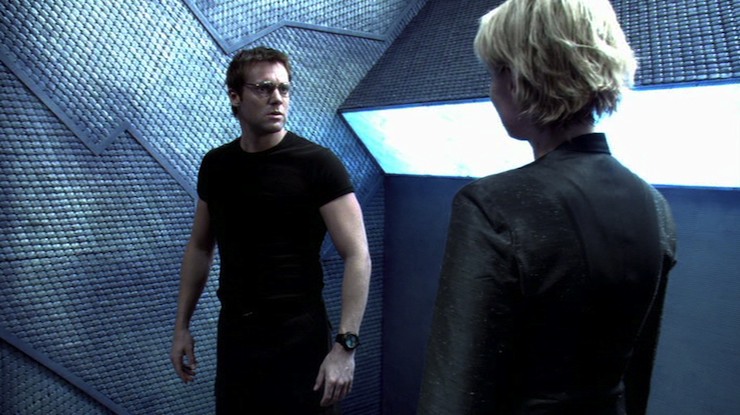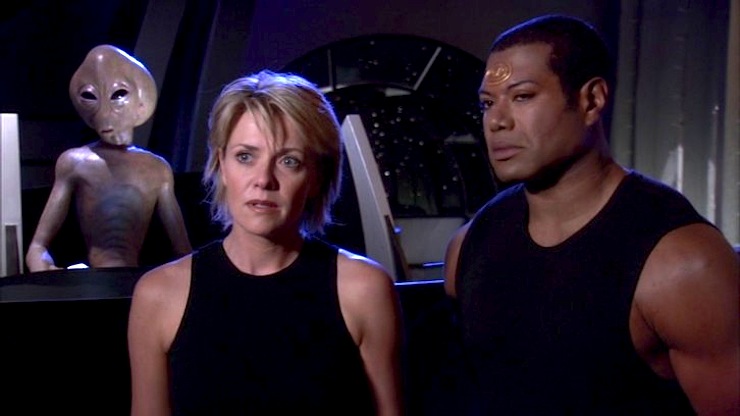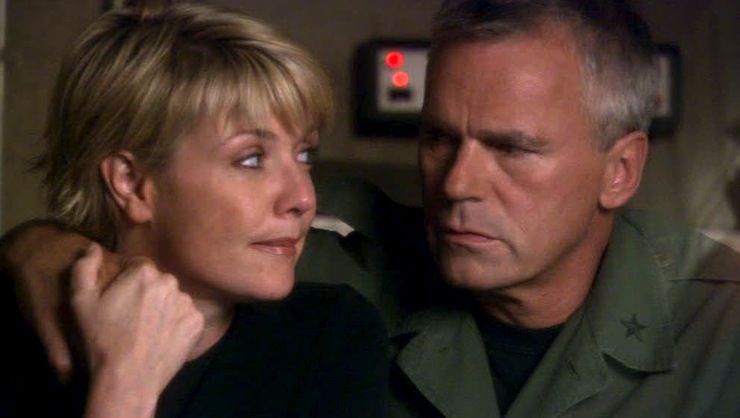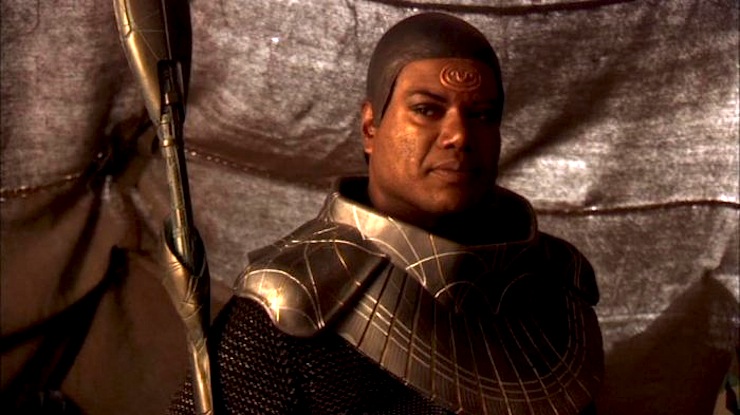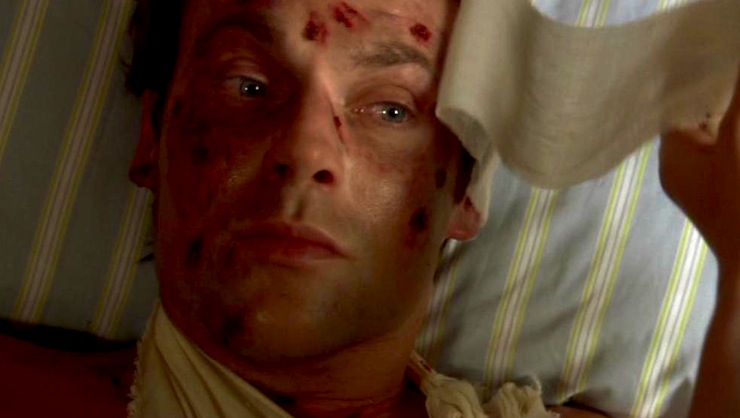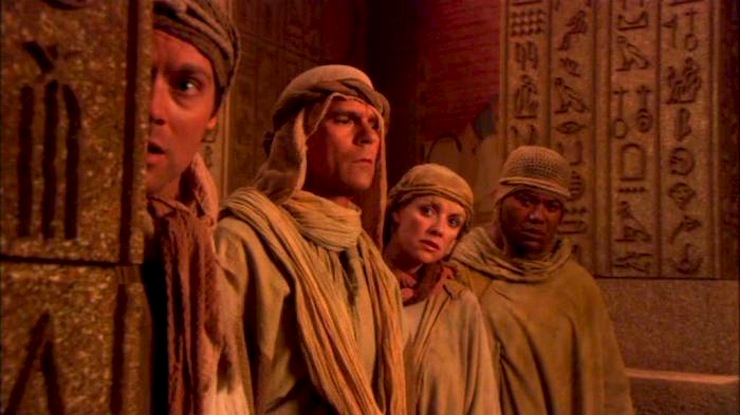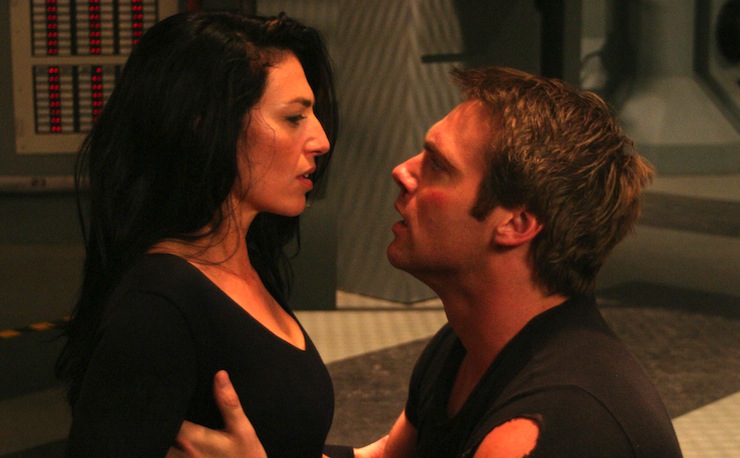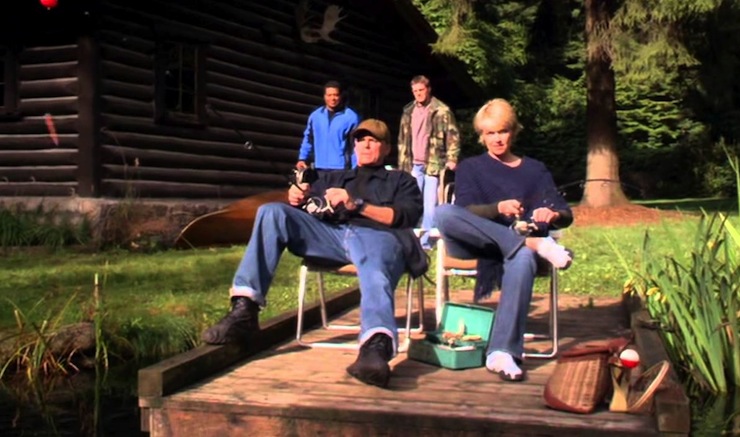Stargate SG-1 Season 8
Executive producers: Robert C. Cooper, Brad Wright, Michael Greenburg, Richard Dean Anderson
Executive producers (“Gemini” onward): Joseph Mallozzi, Paul Mullie
Original air dates: July 9, 2004 – March 25, 2005
Mission briefing. The fallout from the battle with Anubis is both immediate and far-reaching. In the short term, the location of the battle in Antarctica may have kept it out of the public eye, but the governments who signed the Antarctic Treaty became aware of it, and the terms of that treaty meant that all the signatories had to agree on how to proceed to investigate the Ancient outpost—a problem insofar as O’Neill is still in stasis down there with the Ancient repository downloaded into his head.
Dr. Elizabeth Weir is still in charge of the SGC, but once the Antarctic Base is cleared for investigation by an international team of scientists, under the SGC’s command, she transfers there. Her replacement: the newly promoted Brigadier General Jack O’Neill, having been cured by the Asgard. His replacement as CO of SG-1 is the also newly promoted Lt. Colonel Samantha Carter.
Weir takes an expedition to the Pegasus Galaxy and the lost city of Atlantis (about which we’ll talk more next week when we tackle Atlantis season 1). Back in the Milky Way, SG-1 has plenty of Goa’uld problems. Ba’al has taken over Anubis’s fleet, and Anubis himself isn’t as dead as they’d thought. Because he’s partially ascended, he can transfer his consciousness into a human host. He does this repeatedly throughout the season, eventually taking back control of his fleet—and of Ba’al.
The rogue elements of the NID have now formed a new cabal called “the Trust.” They make sure to keep the Stargate program secret, taking extreme measures to silence inventor/industrialist Alec Colson from revealing the SGC to the public, and also sabotaging Teal’c’s attempt to live a normal life outside the SGC. They also use a symbiote poison, refusing to differentiate among rebel Jaffa, Goa’uld, Jaffa loyal to the Goa’uld, and Tok’ra, and thus killing many of Earth’s allies.
Eventually, though, the Trust is taken over by the Goa’uld, who try to start World War III in part by implanting Kinsey.
The rebel Jaffa numbers swell. The Hak’tyl resistance led by Ishta thrives as well, and Teal’c’s son Rya’c wants to marry one of the Hak’tyls, which causes some tension between Teal’c and Ishta—which they solve by killing Moloc.
Several attempts are made to contact the Atlantis expedition. With Earth finally having hyperdrive thanks to the Asgard, Prometheus is sent to the Pegasus galaxy. However, it’s hijacked by Vala Mal Doran, and they are forced to return home to repair damage to the ship. They also search for a new Zero-Point Module, the Ancient power source, to give the Stargate sufficient power to dial Pegasus, which they do at season’s end.
Gate travel continues as always. One of SG-1’s missions results in a war breaking out on Tegalus. Another sends them to the world where Maybourne wound up, where they discover a puddle jumper that’s also a time machine.
Other new technology besides the puddle jumper and the time machine are discovered, including Ancient stones that allow communication over great distances. In addition, Teal’c tests technology previously brought through the gate in “The Gameskeeper” that can be used for virtual reality training.
The human-form Replicators also make a return, leading the Replicators in an attack on the new Asgard homeworld, though that is driven off by a weapon created by the Ancient-influenced O’Neill that destroys Replicators. However, Fifth escapes and creates his very own Replicator version of Carter, who later attacks the SGC and attempts to learn the secrets of Ascension. Jackson is able to defeat her, but at the cost of his life—again—and this time Oma Desala again offers him Ascension. At that point, he learns that Oma also offered Anubis Ascension, which was a huge mistake, and one she finally pays for by battling Anubis for all eternity.
Meanwhile, the other Replicators take on what’s left of the Goa’uld, most of whom have either been defeated by or capitulated to Ba’al, who is in truth under Anubis’s thumb. The rebel Jaffa use the Replicator attack as cover to take Dakara, the legendary homeworld of the Jaffa, currently under Ba’al’s control. While there, they discover an Ancient superweapon that can wipe out the Replicators. With Ba’al’s assistance, Carter and Jacob figure out how to use that weapon to claim victory over the Replicators, and with Anubis’s defeat and the Replicators’ attacks on the Goa’uld, the Jaffa declare their freedom, with the Goa’uld too powerless to stop them.
Catherine Langford dies, and leaves a ton of stuff to Jackson, including the revelation that there’s a ZPM they can retrieve from ancient Egypt, using the puddle jumper from Maybourne’s world. They do so—but also become trapped in ancient Egypt, having altered the timeline. They do record a video for the future, and a much changed SG-1—a bitter, retired O’Neill, an English-as-a-second-language-teaching Jackson, a Carter who’s just a glorified secretary, a still-in-charge-of-Cheyenne Hammond, and an alive Kawalsky—discover the tape and wind up going through the newly discovered Stargate in a puddle jumper to Chulak, where they meet Teal’c. Eventually, they are able to restore the timeline to its proper form (more or less), and the SGC has a ZPM they can use to dial a wormhole to Pegasus.
At the end of the season, they all go to O’Neill’s cabin and go fishing…
Best episode: A three-way tie among the “Reckoning” two-parter, “Threads,” and the “Moebius” two-parter. Written in the belief that they would be the end of the series, these episodes tie up many of the loose ends of the series, ending the threats of both the Goa’uld and the Replicators (though the latter would continue to be a threat in Atlantis, and Ba’al and a few other Goa’uld will continue to cause problems), freeing the Jaffa, and paying tribute to the show’s roots by having the team travel back to face Ra when he was still on Earth and re-create the events of “Children of the Gods” in a different timeline. Between those momentous events, we get a very personal story, where the truth about Jackson’s time as an ascended being finally comes to light, as does how Anubis got so powerful, while Carter says goodbye to more than one man in her life.
Honorable mention: “Icon,” a very well-written, tragic throwback to the simpler days of SG-1 when they went through the gate, found a civilization, and screwed it up in some way. “Prometheus Unbound,” a welcome return from Don S. Davis as Hammond, a magnificent introduction to Claudia Black’s superlative Vala Mal Doran, and just a fun adventure. The “New Order” two-parter sets the season up very nicely, and showcases Torri Higginson’s much-better-than-Jessica-Steen version of Weir (just in time for her to bugger off to the spinoff). And “Zero Hour,” a hilarious day-in-the-life for the newly promoted O’Neill.
Worst episode: The temptation is to say “every episode I didn’t list in the previous section.” Actually, “It’s Good to be King” isn’t too bad, “Citizen Joe” is harmless fun (and has a great guest turn by Dan Castellaneta), and “Lockdown” isn’t a bad adventure. But the rest of the season ranges from weak-tea episodes that have better premises than execution (“Affinity,” “Endgame,” “Gemini,” “Covenant,” “Full Alert”) to misbegotten crap (“Avatar,” “Sacrifices”).
Probably I’d have to give the worst to “Avatar,” just because it was such an obvious tie-in to the Stargate SG-1: The Alliance videogame—and to make matters worse, the game was cancelled and never even happened!
Can’t we just reverse the polarity? The power source for the ancient outpost is given a name: a zero-point module, or ZPM, which will prove useful in the future on all the shows. The Ancient stones, created as a gag for “Citizen Joe,” will become very useful and important in both the next season of SG-1 and on Universe. And, both here in “It’s Good to be King” and in Atlantis‘s “Before I Sleep,” we find out that the Ancients mucked about with time travel.
Also O’Neill asks the Asgard for a hyperdrive for Prometheus in “Covenant,” which is installed for “Prometheus Unbound.” All 302-model ships going forward will have hyperdrives.
For cryin’ out loud! In order to accommodate Richard Dean Anderson’s desire for a reduced workload, the character was promoted to general and put in charge of the SGC. His style is considerably more relaxed than Hammond’s, as highlighted in “Zero Hour,” and he confesses to missing going offworld when he gets to go through the gate in “It’s Good to be King.”
It might work, sir. Carter is promoted to lieutenant colonel and command of SG-1. She also accepts Pete Shanahan’s marriage proposal, but recants after her father dies and she realizes how strong her feelings for O’Neill are.
Indeed. Teal’c grows his hair out (a concession to Christopher Judge, who was tired of shaving his head for seven straight years), and leads the Jaffa rebellion to victory.
“Moebius Part 2” provides one of the best examples of Judge’s acting ability. You don’t realize how much Judge has changed in the role subtly over the years until you see him in the altered timeline as his old self—and then he watches the videotape of the mainline Teal’c, with his relaxed smile as he declares the Jaffa to be free. You can see the difference, and it’s a magnificent thing.
I speak 23 different languages—pick one. Jackson finally finds out why he’s no longer ascended: he kept wanting to interfere, even more than Oma did, and Oma is pretty well ostracized by the other ascended folk as it is, especially after letting Anubis into the club…
You have a go. Hammond is promoted to the head of Homeworld Security, though he comes back to command the Prometheus in “Prometheus Unbound,” and we also see the Hammond of the alternate timeline in “Moebius.” The reduced schedule—which also included an appearance on Atlantis‘s “Home” as an illusion of Hammond—was to accommodate Don S. Davis’s health, as he was beginning to suffer from the heart issues that eventually led to his death in 2008.
Wayward home for out-of-work genre actors. Probably the biggest name is Claudia Black, formerly Aeryn Sun on Farscape, showing up in “Prometheus Unbound” as the very un-Aeryn-like Vala Mal Doran (though her initial appearance on the Prometheus is deliberate homage to her initial appearance on Farscape); Black so impressed the producers and the viewers that the character recurred through season 9 and became a regular in season 10 and the DVD films. Recurring Gene Roddenberry’s Andromeda actors Steve Bacic (Camulus in “New Order” and “Zero Hour”) and Brandy Ledford (“Endgame”) both appear this season. Erica Durance appeared in “Affinity” just before her first appearance as Lois Lane on Smallville. Star Trek vets Jolene Blalock and Ronny Cox both return one final time as Ishta and Kinsey, respectively. And O’Neill’s affinity for The Simpsons is taken to its semi-logical extreme by casting Homer Simpson’s voice himself, Dan Castellaneta, in the title role of “Citizen Joe.”
Trivial matters. This is the first season of the show to have only 20 episodes, instead of 22. Each of SG-1‘s subsequent seasons, as well as all the seasons of Atlantis and Universe, will have 20-episode orders.
This season aired simultaneously with the first season of Atlantis. “New Order” aired for two hours on the 9th of July, then the two parts of the Atlantis premiere “Rising” aired on the 16th. Starting on the 23rd, the two shows aired back to back from 8-10pm EST on the Sci-Fi Channel. The finales dovetailed nicely: Atlantis‘s “Letters from Pegasus” (aired from 9-10pm on the 11th of March) let the SGC know what was going on in Pegasus, prompting the search for a ZPM in “Moebius Part 1” (aired from 8-9pm on the 18th of March). The ZPM that SG-1 recovered in “Moebius Part 2” (8-9pm on the 25th of March) was then used to send a team of Marines through the gate to Atlantis in “The Siege Part 2” (9-10pm on the 25th of March).
The Antarctic Treaty that delays the investigation of the Ancient outpost in Antarctica, and forces them to leave the frozen O’Neill down there for weeks, in the “New Order” two-parter is a real treaty, which went into effect in 1961.
In “Covenant,” Alec Colson is introduced to a Captain Sheffield. Colson is played by Charles Shaughnessy, whose most famous role was as Mr. Sheffield in The Nanny.
Two actors who are big fans of the show petitioned to appear this season: comedian Wayne Brady, who took on a rare serious role as Ares’s First Prime in “It’s Good to be King,” and Pierre Bernard, a staffer on Late Night with Conan O’Brien, who documented his experience as a guest in “Zero Hour” for the talk show (and whose character was, fittingly, named O’Brien).
The sequence in “Moebius Part 2” where McKay tries to name the puddle jumper “Gateship One” to everyone else’s disgust is a repeat of a similar scene in the Atlantis pilot episode “Rising.”
“Moebius” marks the first time Ra has appeared since the original movie, though he’s obviously not played by Jaye Davidson, instead played by Jay Williams. In addition, the season finale brings back several actors for what they thought might be a final hurrah: Peter Williams as Apophis, David Hewlett as McKay (on loan from Atlantis), Jay Acovone as Kawalsky, Colin Cunningham as Davis, Robert Wisden as Samuels, and, of course, Don S. Davis as Hammond.
Chevron seven locked. The episode order for SG-1 was reduced to 20, and the mistake was not making the reduction much much much greater. Instead, we got some strong stuff at the top of the season, the occasional decent episode in the middle, and a magnificent final five hours. But the rest of the season feels like wheel-spinning or a waste of time.
Too many external factors are obviously at work here. The production staff having to split its time between SG-1 and Atlantis is a biggie. The original plan had been to end the former and focus on the latter, but SG-1‘s popularity forced them to put both shows on the air. Plus, of course, there’s Richard Dean Anderson’s desire for less screen time and Don Davis’s health issues, which reduced both characters’ air time. And just in general, we rarely saw SG-1 working as a team. “New Order,” “Reckoning,” “Threads,” “Icon,” “Avatar,” “Covenant,” “Affinity,” “Prometheus Unbound”—all of those episode saw SG-1 split up or separated or some such.
However, the biggest misstep of the entire season was the blown opportunity with the character of Samantha Carter. After promoting her and putting her in charge, she spends almost no time actually leading SG-1 in any meaningful way—though the climax of “Icon” does prove to be a really good showcase for her leadership.
The final five episodes would’ve made a great series finale, a fitting sendoff for the team. Even without that, though, it does an even better job than “Full Circle” did of bringing the show, er, full circle.
Keith R.A. DeCandido‘s short story collection Without a License is now on sale from Dark Quest Books. It includes nine stories from throughout his twenty-plus years of writing, plus brand-new tales in the Dragon Precinct and Cassie Zukav milieus. You can order the trade paperback from Amazon, Barnes & Noble, or directly from the author; the eBook edition will be on sale soon.










